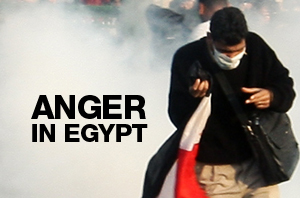ElBaradei arrives in Egypt
Democracy advocate returns to country to join anti-Mubarak protests, the latest of which has claimed one life.

 |
|
Further violence erupted in Cairo on Thursday and in Suez, while in the northern Sinai a protester was killed [Reuters] |
Mohamed ElBaradei, the former head of the UN nuclear watchdog turned democracy advocate, has arrived in Egypt amid escalating political unrest in the country.
ElBaradei, 68, returned to the country on Thursday from the Austrian city of Vienna, where he lives, to join a growing wave of protests against Hosni Mubarak, Egypt’s president of 30 years, inspired by Tunisia’s overthrow of their long-time president, Zine El-Abidine Ben Ali.
Violence erupted in Cairo and in the flashpoint city of Suez, east of the Egyptian capital, while in the northern Sinai area of Sheikh Zuweid, several hundred bedouins and police exchanged live gunfire, killing a 17-year-old man.
Social networking sites were abuzz with talk that Friday’s planned anti-government rallies could be some of the biggest so far calling for the overthrow of the 82-year-old president.
Millions gather at mosques across the city for Friday prayers, providing organisers with a huge number of people already out on the streets to tap into.
“It is a critical time in the life of Egypt. I have come to participate with the Egyptian people,” ElBaradei said as he left Cairo airport, where he was greeted by a small group of supporters.
“The desire for change must be respected. The regime must not use violence in the demonstrations.”
Earlier ElBaradei, a Nobel peace laureate, said he was ready to “lead the transition” in Egypt if asked.
Street battles
During Thursday’s clashes in Suez, the protesters stoned lines of helmeted riot police with shields, who fired back with rubber bullets, water cannons and tear gas. Debris and rocks littered the streets.
Demonstrators ran through white clouds of tear gas and kicked the canisters back at police. Some shielded themselves with overturned metal dumpsters and hurled rocks from behind the makeshift barricades. Police said 30 people were injured in the melee.
Protesters later hurled Molotov cocktails at a fire station in the city, setting it ablaze.
|
“The intensity continues to increase,” Al Jazeera’s Jamal Elshayyal reported from Suez.
“There have been fierce clashes with rubber-coated steel bullets being fired by the riot police as well as tear gas.
“It seems like these protests will go into the night.”
In Ismailia, hundreds of protesters clashed with police who used tear gas and batons to disperse them.
Associated Press reporters saw scores of protesters outside the Cairo offices of Egypt’s lawyers’ union, which has been one of the flashpoints of this week’s unrest.
There were two other small, peaceful protests by lawyers in the Mediterranean port city of Alexandria and the Nile Delta town of Toukh, north of Cairo.
In the day’s other major incident, protesters in the northern Sinai – an area of land largely populated by armed Bedouin tribes – blocked the main roads in the area.
The relationship between the bedouins of Sinai and the government has traditionally been tense, with hundreds of residents rounded up in security sweeps in recent years.
By Thursday evening, Facebook, Twitter and Blackberry Messenger services were interrupted, possibly a move by authorities to hamper protesters from organising.
The protesters have already achieved a major feat by sustaining their demonstrations for three days in the face of a harsh police crackdown. Seven people have been killed, hundreds hurt and nearly 1,000 detained.
‘Tense mood’
Al Jazeera’s Ayman Mohyeldin said the situation remains tense in Cairo and across the country.
“The city in general is in a very tense mood. Throughout the course of the evening police will be deployed across the capital,” he said.
“The interior ministry is not going to take any chances ahead of tomorrow’s demonstrations, expected to take place after Friday prayers. This is a sign that the country is bracing itself for what could be a potentially very explosive Friday.”
Against this backdrop, Essam al-Arian, spokesman for Egypt’s Muslim Brotherhood, warned the Mubarak government of the consequences of a breakdown of the situation “if the government continued to turn a deaf ear to popular calls”.
“The protest rallies will not stop while Friday will be another ‘day of wrath’,” al-Arian said.
